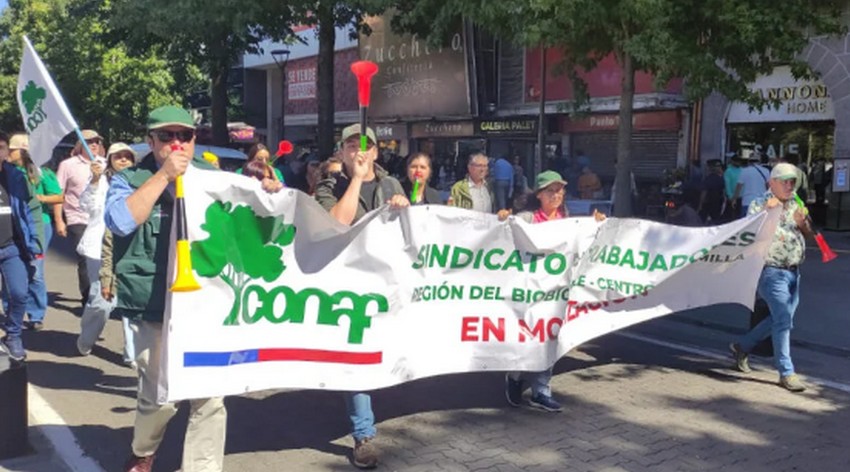This past Monday, the strike called by the Union of Workers of the National Forestry Corporation (Conaf) began in the Biobío and Ñuble regions, in protest against the rejection in the Chamber of Deputies of various provisions of the bill creating the National Forestry Service (Sernafor).
Their first demand is to restore the new service's authority to issue binding technical reports on the declaration of degraded areas and ecological management plans, which they argue ensures decisions based on technical and scientific criteria. Additionally, they demand the reinstatement of Conaf officials' authority to act as notaries in detecting forestry violations, such as illegal logging and timber theft—tools they deem essential to effectively combat these crimes.
The work stoppage, initially set to last two days (Monday, March 17, and Tuesday, March 18), primarily affects the agency's administrative tasks, though workers assured that emergency services related to wildfire response will continue.
Juan Carlos Bascur Quiroz, provincial head of Conaf in Biobío province, confirmed partial adherence to the strike by unionized workers. "In Biobío province, indeed, unionized workers joined this call. We have a total of 22 unionized workers, of whom 13 are participating in the mobilization. Five are not mobilized, one colleague is on leave, and three are teleworking," he detailed.
REASONS FOR THE STRIKE
Ana Méndez, regional lawyer for Conaf and president of the Biobío, Ñuble, and Seed Center Workers' Union, explained that the main reason for this mobilization is concern over the weakening of the institution's functions under the new public service.
"The Sernafor bill, which transforms Conaf, weakens the functions we have historically held, such as the authority to determine degraded zones and develop binding management plans," she stated.
She added that this change poses a problem not only for workers but for the country. "The constant loss of functions disregards the technical expertise we have accumulated over 60 years. This weakening could lead to worker layoffs and harm native forest protection, with economic and social consequences lawmakers are not foreseeing," Méndez emphasized.
Furthermore, the union leader highlighted Conaf's historical role in environmental protection, citing its involvement in projects like HidroAysén and Dominga, where the institution always prioritized environmental preservation. "No one can say Conaf is against the environment. On the contrary, we have always been protectors. It's inexplicable that our institutional contributions are not recognized and respected," she asserted.
SERVICE IMPACT AND EMERGENCY CONTINUITY
While the strike mainly affects administrative tasks, such as public services for burn permits and penalties, Juan Carlos Bascur, Conaf's provincial head, assured that forest emergencies will not be compromised. "We are a response agency for wildfire combat, and colleagues in that area will continue their work. The public can rest assured in that regard," he clarified.
Meanwhile, the union president noted that this strike is a nationwide mobilization, initially called for two days but potentially extending indefinitely depending on the outcome of the mixed congressional committee vote scheduled for Tuesday afternoon. "This is our last chance. If we fail to restore the rejected authorities, the stoppage could continue indefinitely," she warned.
Regarding national parks, Bascur mentioned that their workers have not yet joined the strike, though the decision remains under evaluation. "They have a separate union and are currently serving the public as usual," he added.
The strike will initially last until Tuesday, March 18, pending the resolution of the situation in the Mixed Congressional Committee, where the disputed article will be voted on again.
Meanwhile, Bascur reiterated that any changes in the situation will be communicated to the public through Conaf's official channels.
Source:La Tribuna







Comentarios (0)
No hay comentarios aún. ¡Sé el primero en comentar!
Deja un comentario